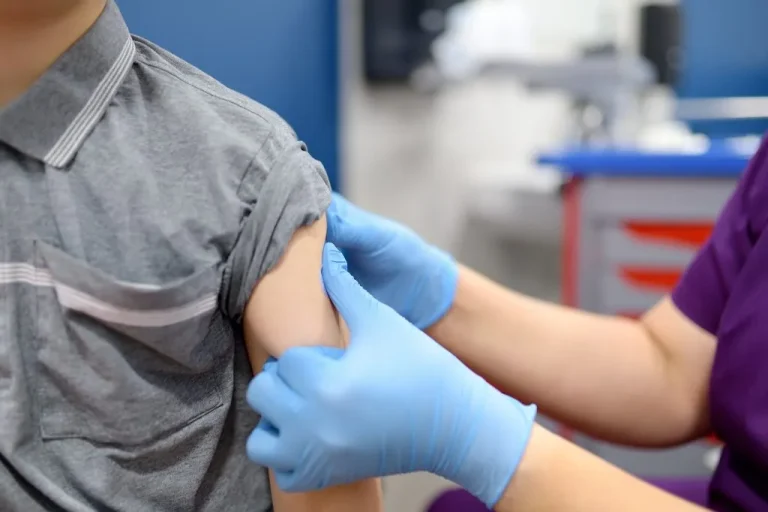Poor contact between parents and “familiar and trusted” healthcare professionals, including practice nurses and health visitors, is contributing to the slump in childhood vaccination uptake, according to research.
In a new report published this month, the Royal College of Paediatrics and Child Health (RCPCH) has highlighted the critical role of nurses in driving vaccination uptake among children.
“The widening inequalities and decline in vaccine uptake rates are a national cause for concern”
Alison Morton
It comes as the World Health Organization recommends that at least 95% of children are immunised against vaccine-preventable diseases.
In the UK, not a single routine childhood vaccine has hit that target since 2021, with diseases like measles and whooping cough seeing a resurgence due to declining vaccination rates.
This trend prompted the RCPCH to set up a commission on immunisation access, uptake and equity, which examined national data and gathered insights from healthcare workers to better understand the problem.
The resulting report has identified several barriers to vaccination, including parents missing the trusted role of nurses in providing essential information.
Parents told the review that they wanted more contact with “familiar, known, trusted” practice nurses or health visitors – professionals they would speak with and ask questions.
When parents reported being unable to speak to a nurse, many said they had turned to the internet to do their own research, the report noted.
The Institute of Health Visiting’s (iHV) annual report, published in January, found demand for health visitors had risen in the past 12 months, with only 45% of English health visitors reporting being able to provide continuity of care to families.
Most health visitors (86%) in England noted that family poverty was one of the most significant issues relating to health education and appropriate uptake of vaccines.
When asked if they had the knowledge, skills and confidence to support families with immunisations, in line with the government’s aspirations for health visiting, 61% said ‘no’.
Responding to the RCPCH report, Alison Morton, the iHV’s chief executive, said: “Whilst most parents get their children vaccinated without hesitation, the widening inequalities and decline in vaccine uptake rates are a national cause for concern.
“This timely report presents a compelling case to ensure babies and children are protected against serious diseases that were once feared by families and can cause so much unnecessary harm,” she said.
Other barriers identified by the RCPCH report included difficulties booking appointments and lack of convenient time slots.
Parents cited long waiting times when contacting GP surgeries, limited availability of appointments and challenges fitting visits around work and childcare responsibilities.
In addition, the report found there was “insufficient or unclear information” about what which vaccinations their child needed and when, as well as lack of detail about potential side effects and the rationale for certain jabs.
Concerningly, the report also found that some health professionals lacked up-to-date knowledge about vaccines and were unable to discuss potential side effects with families.
Some parents even said they felt discouraged from vaccinating their children by the professionals they spoke to, and reported feeling judged for raising concerns or having beliefs in alternative medicine.
The report noted a growing disparity in vaccine uptake among some ethnic minority groups, socio-economically disadvantaged families and migrant communities.
These groups faced additional barriers, such as limited access to information due to language difficulties, digital exclusion, challenges in navigating the NHS and a lack of targeted outreach.
To help reverse the decline in vaccination rates, the commission called for sufficient funding for health visitors “to be able to undertake their vital role in delivering vaccinations”, as well as investment to expand vaccination service capacity.
The commission also called for improved training and development of all staff to promote vaccinations, as well as protected funding for school nurses.
Additionally, it recommended improving the accessibility of health information for families, including standardised information at national level translated into multiple languages.

Alison Morton
Ms Morton said the report set out the evidence “on how to reverse the current trend” of poor vaccination uptake.
She added: “By working together across national government and local systems, we can tackle the systemic barriers that make it harder for some families to get the vaccines their children need.
“This includes investing in health visitors who remain parents’ first port of call for trusted advice and, with sufficient funding, are ideally placed to deliver vaccinations to vulnerable groups.”
Meanwhile, Dr Julie Yates, deputy director of immunisation programmes at the UK Health Security Agency, said: “We know our colleagues in general practice and other services are working exceptionally hard to deliver our immunisation programmes and through their efforts they protect millions of children each year.
“However, we must not become complacent, and UKHSA is committed to working with the NHS and partners to improve childhood vaccine uptake.
She added: “Getting our vaccination rates up to the 95% WHO target to eliminate these diseases will take sustained effort and a long-term effort across the public health system but we are committed to working together and with families to do this.”

